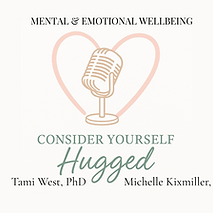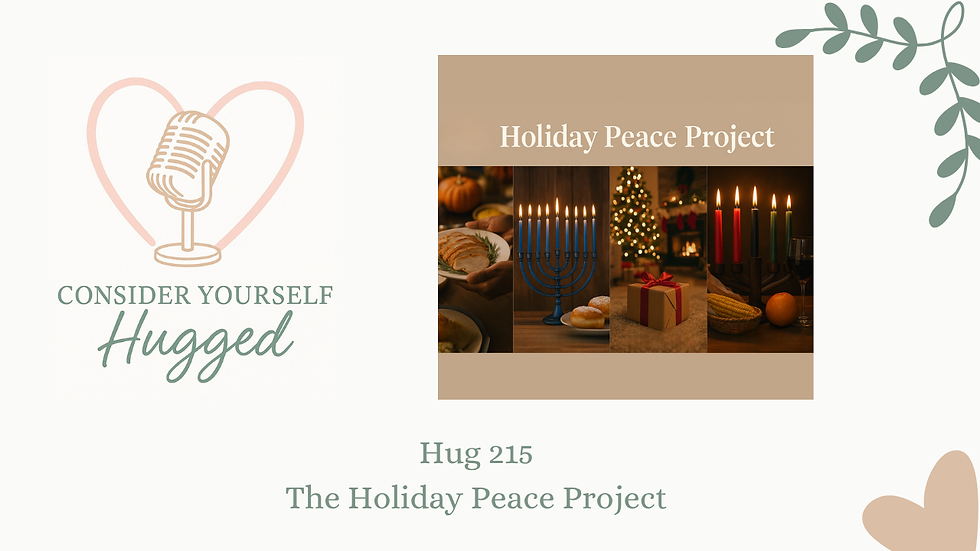Finding Help: Resources for mental health
- Tami West

- Oct 15
- 4 min read
Hey friends it’s just me today! If you watched our last episode, you know Michelle led a beautiful conversation about mental health diagnoses in honor of World Mental Health Day. This week, I’m following up with something I’ve been passionate about for a long time: finding mental health resources, especially when you don’t even know what’s out there.
Today I"m sharing three stories that shaped my heart for helping others find help.
Story #1: My first time accessing mental health care, 1995. I was deep in panic attacks, couldn’t leave my bedroom, and had no idea where to turn. It took finding out about a workplace EAP (Employee Assistance Program) to get me into crisis counseling, and eventually a psychiatric hospital. That’s when I learned two truths that still guide me today:
Sometimes people don’t get help simply because they don’t know where to start.
The earlier you seek help, the easier your journey may be.
Story #2: Years later, when my mom’s depression and behavior became unmanageable, I still didn’t know where to turn, even with all my education and experience. A dear friend connected me with a social worker who met with our family and helped us navigate options, including a geriatric psychiatric unit. It was complicated and painful, but it taught me that:
Sometimes you just need someone to point you in the right direction.
Story #3: During the pandemic, my own mental health took a dive. After decades of speaking, writing, and teaching about anxiety, I was ashamed to admit I needed help again. But Michelle’s words stuck with me: “Sometimes self-help isn’t enough.” For some people, coping tools are enough; for others, for me, we need more. And there is no shame in that. More later on that!
For some people, self help is not enough.
The Resource Roadmap - Click here to download a PDF Resource Guide
I’ve organized resources into six simple categories so you can find what fits your needs:
Crisis Support – Call 911 if there’s immediate danger, and remember Brittany’s powerful words: “Better alive and mad at you for a while than dead forever.” You can also call or text 988, the Suicide and Crisis Lifeline, for help with suicidal thoughts, self-harm, or when you just don’t know what to do.
Workplace Resources – If you have a full-time job, ask about your Employee Assistance Program (EAP). Many people don’t even know they have one! EAPs often include free counseling sessions, virtual therapy, and financial or wellness resources.
Community Resources – Check local nonprofits, NAMI chapters, or dial 211 to find nearby support. There’s power in local connection, support groups, clinics, and community-based programs can make help feel less out of reach.
Hidden Gems – Dig into your insurance portal or virtual care apps like Teladoc, BetterHelp, or Talkspace. You might have free mental health visits buried in your plan! If you’re uninsured or underinsured, look for your state’s programs that could address your needs.
Faith-Based Support – Many churches offer counseling or peer support groups. Whether or not you’re religious, these programs can provide affordable, compassionate help.
Professional Help – Medical doctors, nurse practitioners, psychiatrists, therapists, social workers, all have different roles. Some prescribe medication; others provide therapy or specialized support. Know who’s who and find what combination works for you.
💡 What I Hope You’ll Remember
You are never alone.Help is available.And getting help is not weakness, it’s wisdom.
Please don’t let anyone shame you into silence or suffering. Whether it’s a walk, a counselor, medication, or faith, your path is yours, and it’s special for you!
Promised Links:
⚠️ Disclaimer
This episode is for educational and informational purposes only and is not a substitute for professional mental health care.
If you or someone you know is in crisis, please call or text 988 to reach the Suicide and Crisis Lifeline, or visit 988lifeline.org for chat and resources
Connect with us
Instagram: Consider Yourself Hugged
TikTok: Short clips, teacher stories, and joy experiments
YouTube: Full episodes + video snippets
Women’s Group: A Place for Women—ongoing community & conversation
And, until next time..... Consider Yourself Hugged!!
Michelle & Tami

About Tami & Michelle:
Michelle Kixmiller, PMHNP
Michelle is a Board Certified Psychiatric Mental Health Nurse Practitioner and Licensed Educator. She works with children and adults with mental health needs including depression, anxiety, bipolar disorder, post-traumatic stress disorder, ADHD, autism, schizophrenia, and obsessive compulsive disorder.
Tami West, PhD
Stress and Mental Health Expert Dr. Tami West uses her entertaining and compelling style to shine a new light on how to transform your life and discover solutions to life’s challenges. Tami has worked in a variety of industries including healthcare, school nutrition, corporate sales, and 10 years as a public-school teacher. In 2013 she received her PhD in Human Development, studying the connections among stress, emotions, and identity.
Thanks for joining! **Not intended to be therapy or replace therapy - If you need further help, please reach out to one of the resources:
General Resources
National Alliance of Mental Illness: https://www.nami.org
Mental Health America: https://mhanational.org
Mental Health First Aid Resources: https://www.mentalhealthfirstaid.org/
Celebrate Recovery: https://www.celebraterecovery.com/
About AA: https://www.aa.org/
**The information shared in this episode is for educational and informational purposes only and is not a substitute for professional mental health care.If you or someone you know is struggling, please seek help from a qualified professional.
If you’re in crisis, call or text 988 to reach the Suicide and Crisis Lifeline, or visit 988lifeline.org for chat and resources.
.png)



Comments